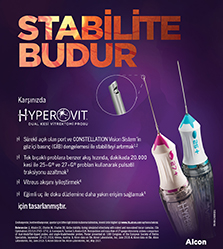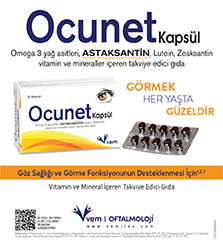Retina-Vitreous
2010 , Vol 18 , Num 3
Effects of Octreotide in Experimental Proliferative Vitreoretınopathy
1Fırat Üniversitesi, Tıp Fakültesi Hastanesi Göz Hastalıkları A.D., Elazığ, Yrd. Doç. Dr.2Fırat Üniversitesi, Tıp Fakültesi Hastanesi Göz Hastalıkları A.D., Elazığ, Uz. Dr.
3Fırat Üniversitesi, Tıp Fakültesi Hastanesi Göz Hastalıkları A.D., Elazığ, Prof. Dr.
4Fırat Üniversitesi, Tıp Fakültesi Hastanesi Patoloji A.D., Elazığ, Yrd. Doç. Dr. Purpose: In this study, we aimed to invastigate the effect of octreotide on the development of proliferative vitreoretinopathy (PVR).
Materials and Methods: In this study, of 21 guinea pigs were randomly assigned to form three groups each including seven animals. Group 1 was defined as the control group and 0.2 ml saline solution was applied intravitreally in a location of 1.5 mm behind the limbus. Group 2 was defined as the sham group and 0.07 IU dispase in 0.1 ml and 0.1 ml saline solution were applied via the same route and 0.07 IU dispase in 0.1 ml and 1 mg octreotide in 0.1 ml were applied intravitreally in Group 3 which was defined as the treatment group. Octreotide was applied twice during the experimental priod. At the end of 10 weeks, eyes have been dissected saggitaly through corneal apex to the optic nevre. After histopathologic preperation, formation of epiretinal membrane, corruption on internal limiting membrane, existence of retinal fold and caryopycnosis in ganglion cells were examined.
Results: In the treatment group, histopathologic examination revealed significant decrease in epiretinal membrane formation and internal limiting membrane corruption (p<0.05).
Conclusion: As the result, it has been observed that octreotide might partially inhibit PVR formation. Due to its lesser side effects, it might be a more reliable and effective drug in PVR when the side effects of the previous ones are taken into account. Keywords : PVR, octreotide, growth factors




